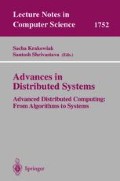Abstract
In a distributed system, replication of components, such as objects, is a well known way of achieving availability. For increased availability, crashed and disconnected components must be replaced by new components on available spare nodes. This replacement results in the membership of the replicated group ‘walking’ over a number of machines during system operation. In this context, we address the problem of reconfiguring a group after the group as an entity has failed. Such a failure is termed a group failure which, for example, can be the crash of every component in the group or the group being partitioned into minority islands. The solution assumes crash-proof storage, and eventual recovery of crashed nodes and healing of partitions. It guarantees that (i) the number of groups reconfigured after a group failure is never more than one, and (ii) the reconfigured group contains a majority of the components which were members of the group just before the group failure occurred, so that the loss of state information due to a group failure is minimal. Though the protocol is subject to blocking, it remains efficient in terms of communication rounds and use of stable store, during both normal operations and reconfiguration after a group failure.
Access this chapter
Tax calculation will be finalised at checkout
Purchases are for personal use only
Preview
Unable to display preview. Download preview PDF.
References
Y. Amir, Dolev, D., Kramer, S., and Malki, D., “Membership Algorithm for Multicast Communication Groups”, Proc. of 6th Intl. Workshop on Dist. Algorithms, pp 292–312, November 1992.
O. Babaoglu, R. Davoli, and A Montresor, “Group Membership and View Synchrony in Partitionable Asynchronous Distributed Systems: Specifications”, Technical Report UBLCS-95-18, Dept. of Computer Science, University of Bologna, Italy, Nov 1995.
O. Babaoglu, A. Bartoli, and G Dini, “Enriched View Synchrony: A Programming Paradigm for Partitionable Asynchronous Distributed Systems”, IEEE ToCS, 46(6), June 1997, pp.642–658.
K. Birman and T. Joseph, “Exploiting virtual synchrony in distributed systems”, Proc. of 11th ACM Symposium on Operating System Principles, Austin, November 1987, pp. 123–138.
D. Black, P. Ezhilchelvan and S.K. Shrivastava, “Determining the Last Membership of a Process Group after a Total Failure”, Tech. Report No. 602, Dept. of Computing Science, University of Newcastle upon Tyne.
T. D. Chandra, V. Hadzilacos, and S. Toueg, “The weakest Failure Detector for Solving Consensus”, JACM, 43(4), pp. 685–722, July 1996.
P. Ezhilchelvan, R. Macedo and S. K. Shrivastava, “Newtop: a fault-tolerant group communication protocol”, 15th IEEE Intl. Conf. on Distributed Computing Systems, Vancouver, May 1995, pp. 296–306.
P D Ezhilchelvan and S K Shrivastava, “Enhancing Replica Management Services to Tolerate Group Failures”, Proceedings of the second International Symposium on Object oriented Real-time Computing (ISORC), May 1999, St Malo, France.
P Felber, R Guerraoui and A Schiper, “The implementation of CORBA Object service”, Theory and Prctice of Object Systems, Vol. 4,No. 2, 1998, pp. 93–105.
J N Gray, “Notes on Database Operating Systems”, In Operating Systems: An Advanced Course, Lecture Notes In Computer Science, Vol 60, pp. 393–481. Springer Verlag, Berlin, 1978.
M. Hurfin and M. Raynal, “Asynchronous Protocols to Meet Real-Time Constraints: Is It Really Sensible? How to Proceed?”, Proc. of 1st Int. Symp. on Object-Oriented Real-Time Distributed Computing, (ISORC98) pp. 290–297, April 98.
S Jajodia and D Mutchler, “Dynamic Voting Algorithms for Maintaining the Consistency of a Replicated Database”, ACM Transactions on Database Systems, Vol 15,No 2, June 1990, pp. 230–280
I Keidar and D Dolev, “Increasing the Resilience of Distributed and Replicated Database Systems”, Journal of Computer and System Sciences (JCSS). 1995.
E Y Lotem, I Keidar and D Dolev, “Dynamic Voting for Consistent Primary Components”, Proceedings of ACM Symposium on Principles of Distributed Computing (PODC), pp. 63–71, 1997.
C Malloth and A Schiper, “Virtually Synchronous Communication in Large Scale Networks”, BROADCAST Third Year Report, Vol 3, Chapter 2, July 1995. (Anonymous ftp from broadcast.esprit.ec.org in directory projects/broadcast/reports)
P. M. Melliar-Smith, Moser L.E., and Agarwala, V., “Membership Algorithms for Asynchronous Distributed Systems”, Proc. of 12th Intl. Conf. on Distributed Comp. Systems, pp. 480–488, May 1991.
S. Mishra, L. Peterson and R. Schlichting, “A membership Protocol Based on Partial Order”, Proc. IFIP Conf. on Dependable Computing For Critical Applications, Tuscon, Feb. 1991, pp 137–145.
L.E. Moser, P.M. Melliar-Smith et al, “Totem: a Fault-tolerant multicast group communication system”, CACM, 39(4), April 1996, pp. 54–63.
P. Murray, R. Flemming, P. Harry and P. Vickers, “Somersault software fault-tolerance”, Hewlett-Packard Technical Report, 1997.
A. Ricciardi and K P Birman, “Using Process Groups to Implement Failure Detection in Asynchronous Environments”, In Proceedings of ACM symposium on PoDC, pp. 480–488, May 91.
A Schiper and A Sandoz, “Primary-Partition Virtually Synchronous Communication is Harder Than Consensus”, Proc. of the 8th International Workshop on Distributed Algorithms (WDAG-94), Sept. 94, LNCS 857, Springer Verlag. (Also in BROADCAST Second Year Report, Vol 2, October 1994).
D. Skeen, “Non-Blocking Commit Protocols”, ACM SIGMOD, pp.133–142, 1981.
Author information
Authors and Affiliations
Editor information
Editors and Affiliations
Rights and permissions
Copyright information
© 2000 Springer-Verlag Berlin Heidelberg
About this chapter
Cite this chapter
Ezhilchelvan, P.D., Shrivastava, S.K. (2000). Enhancing Replica Management Services to Cope with Group Failures. In: Krakowiak, S., Shrivastava, S. (eds) Advances in Distributed Systems. Lecture Notes in Computer Science, vol 1752. Springer, Berlin, Heidelberg. https://doi.org/10.1007/3-540-46475-1_4
Download citation
DOI: https://doi.org/10.1007/3-540-46475-1_4
Published:
Publisher Name: Springer, Berlin, Heidelberg
Print ISBN: 978-3-540-67196-1
Online ISBN: 978-3-540-46475-4
eBook Packages: Springer Book Archive

